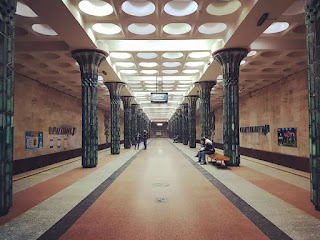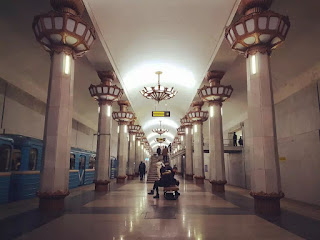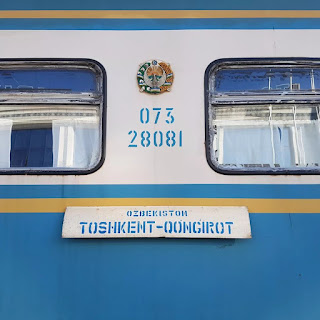Not India
I had intended to travel to South India for Christmas; however, my scheming went awry and so I find myself, thanks to the catastrophically long queues at the Indian High Commission and my own inadequate foresight, in Uzbekistan, a country with, mercifully, no visa requirements for stays of up to 30 days.
In truth I found myself rather excited not to go to India. I have dreamed for years of travelling the Golden Road to Samarkand, and would have come in 2020 but for the pandemic. That year I wished to explore the world's only two doubly land-locked countries, Uzbekistan and Liechtenstein; walking around the latter's 75km trail. I stayed home with everyone else and, when I was allowed out, walked around the Isle of Wight instead, which has a much longer circumference than the tiny principality, and quite a lot more coastline.
I arrived in Tashkent without much expectation of what I might find, and was pleasantly surprised from my very first encounter outside the airport; a kindly man who tried insistently (but unsuccessfully) to pay for my bus fare, thrusting notes into my hand.
Things did not go quite as smoothly in Chorsu Bazaar, where a man berated me in Russian for not understanding Uzbek or Russian when I tried to pay for pomegranate juice. In fact I had learned the Cyrillic script and some basic Russian phrases, although not how to count, and I understood enough to know I was being admonished. I spent the next few hours learning the Uzbek numbers.
Eager to see the famous Tashkent metro, modelled on the Moscow design, I left a trail of touristic confusion in my wake. At the kiosk I bought five tickets, wanting both to use my new-found knowledge and to be economical with time. I took my dangling string of paper tokens to the table where a police officer was waiting to check my bag. He pointed to my tickets; there was clearly a problem. He located a shy youth with some English, who asked me, "Do you have friends?" Hoping they wouldn't take my answer too literally, I confirmed "нет" (nyet). "Then this is too many tickets", the young man explained. "They are only valid for 30 minutes". The guard shouted over to the kiosk, sternly instructing the cashier to refund me the spares. Feeling foolish but grateful for the assistance, I rejoined the ticket queue.
When I finally reached the barrier, my remaining ticket did not work its magic. Another kind commuter helped me, waving the paper about above the scanner, but in the confusion both of us missed the light turning green. Eventually a guard let me through a side gate. I scuttled away from the scene of my chaos and into the anonymity of the underground, where I spent a happy morning exploring the different stations.
 |
| Alisher Navoi |
 |
| Chorsu |
 |
| Gafur Gulyom |
 |
| Kosmonavtlar |
 |
| Ozbekiston |
 |
| Toshkent |
 |
| Amir Timur |
To Samarkand
At Tashkent-Yuzhniy I boarded a rattling, Soviet-era train with a coal samovar at the end of the carriage. Most passengers made chay with hot water from the samovar and then jumped into bed; I watched the empty steppe pass, with Kazakhstan 5km away at the closest point. Near sunset the landscape changed to snowy mountains and sleepy agricultural villages, with shaggy goats minded by shepherds bundled up against the cold.
 |
| Most passengers went to bed |
In Samarkand at last, I arrived at my guesthouse, Antica B&B, a homely place recommended by the excellent Bradt guide, which had enticed me, being of Winnie-The-Pooh-ish disposition, with a simple sentence: "The breakfasts are the best in Uzbekistan - this book isn't long enough to finish extolling the virtues of the homemade jams". My host ushered me inside to a room of bright carpets and carved wood, and gave me slippers and hot tea. I felt I was an Eastern trader arriving at a caravanserai after many hard months travelling the Silk Road on a disgruntled dromedary.
Jamarkand
The breakfast did not disappoint. I was the only guest at a table large enough for eight, and the spread almost filled the space nonetheless. Crispy potato squares, tomato omelette, cheese, charcuterie, coffee, milk, three different types of bread, and three jams, all homemade by my hosts. A dark cassis, thick and sticky, refusing to part from the spoon. Whole white and yellow cherries in a runny amber sauce. And - Sultana of jams! - whole crystallised figs bathed in rose honey the colour of autumn sunlight.
 |
| Figs in rose honey |
On my second morning I awoke excitedly for more honeyed figs. But to my delight, I was met by three entirely different jams. A joyous summer strawberry, a deeply purply-black mulberry, and a soft, yellow apple preserve awaited me. My mind wandered jamwards, enraptured. If I have three new jams a day, I extrapolated stickily, I could have over 90 jams a month, or 1,095 new jams a year. I thought of lockdown and the strange time of not knowing when I was. I ate a lot of jam then too, but quite sadly.
 |
| Cassis blackcurrant |
On the third morning there were two new jams, alongside the white and yellow cherries. Tiny red cherries in a ruby sauce crying out for magret de canard, and a bronze-black treacly plum completed the set. I was as captivated by daily jam as King Shahryar by Scheherazade's nightly stories.
"It's very good jam", the White Queen said to Alice. "The rule is, jam to-morrow and jam yesterday — and also jam to-day."
_______
If you enjoyed this post, you can follow me to receive new posts by email. Thank you for reading!
Or see more posts here: Get in the tuktuk, no time to explain
More on Uzbekistan:Photos of the beautiful Tashkent Metro
Or see more posts here: Get in the tuktuk, no time to explain


Comments
Post a Comment